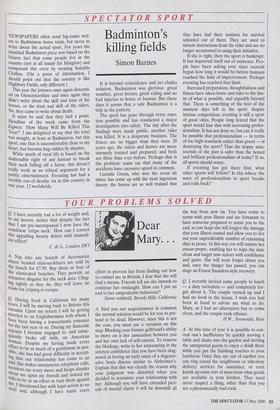SPECTATOR SPORT
Badminton's killing fields
Simon Barnes
NEWSPAPERS often send big-name writ- ers to Badminton horse trials, but never to write about the actual sport. For years the standard Badminton piece was based on the bizarre fact that some people live in the Country (not at all handy for Islington) and compound this error by wearing Suitable Clothes. (On a point of information, I should point out that the country is like Highbury Fields, only different.) This year the journos once again descend- ed on Gloucestershire and once again they didn't write about the skill and trust of the horses, or the trust and skill of the riders. No, they came to write about death.
It must be said that they had a point. Headline of the week came from the Express: 'How Many Will Be Killed This Year?' I am delighted to say that the total Was nought, at least at Badminton, but this sport, one that is uncomfortably close to my heart, has become hag-ridden by disaster. While much of rural life is based on the inalienable right of any human to break their neck falling off a horse, this doesn't really work as an ethical argument for a public entertainment. Eventing has hadi a terrible run of deaths: six in this country n one year, 12 worldwide. It is beyond coincidence and yet eludes solution. Badminton was glorious: great weather, great horses, great riding and no bad injuries to horse or human. But these days it seems that a safe Badminton is a blip in the pattern.
The sport has gone through every emo- tion possible and has conducted a major investigation into safety. The day after the findings were made public, another rider was killed. It is a desperate business. The fences are no bigger than they were 20 years ago, the riders and horses are more intensely trained and prepared, and both are fitter than ever before. Perhaps that is the problem: some say that many of the accidents have excessive speed in common.
Lucinda Green, who won the event six times, has come up with the most ingenious theory: the horses are so well trained that they have had their instincts for survival schooled out of them. They are used to minute instructions from the rider and are no longer accustomed to using their initiative.
If she is right, then the sport is bankrupt. It has improved itself out of existence. Peo- ple have been asking ever since records began how long it would be before humans reached the limit of improvement. Perhaps eventing has reached that limit.
Increased preparation, thoughtfulness and fitness have taken horse and rider to the lim- its of what is possible, and arguably beyond that. There is something of the best of the amateur days left in the sport: despite intense competition, eventing is still a sport of good vibes. People long feared that the sport would lose that with increasing profes- sionalism. It has not done so, but can it really be possible that professionalism — in terms of too high standards rather than greed — is destroying the sport? That the sloppy ama- teurism of the past is safer than the honed and brilliant professionalism of today? If so, all sports should worry.
If eventing has got there first, what other sports will follow? Is this where the wave of professionalism in sport breaks and rolls back?


























































 Previous page
Previous page